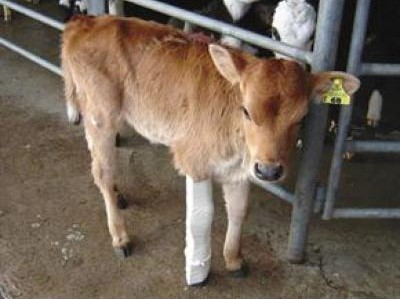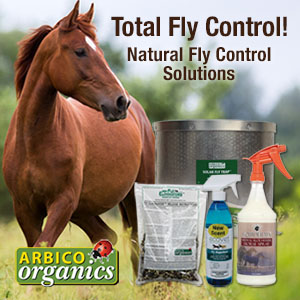
The other morning, I was out checking on my cows and calves when I noticed one of my calves was limping. I took a closer look and found that it was badly swollen on the back right leg. I don’t know if the calf was just playing and broke it or a cow stepped on its leg or what exactly happened, but I knew I would have to try and do something to help this calf. She was only six days old.
I drove the cow and calf into the corral and decided to call my vet. He told me to bring her in and he would splint it, or I could do it myself. There are times when I would not hesitate for the vet to come out and help care for wounded or sick animals. But the cost is usually much more then what the animal will bring if taken to the market. So, after careful deliberation, I chose to splint this calf’s leg myself.
First, check to see if there is any puncture where the bone might have penetrated through the skin. If there is no puncture through the skin, then it is probably a small fracture and will heal nicely. I was lucky and found no cut or penetration through the skin. Carefully wrap the leg with an ace wrap, cloth, or foam. Make sure you get the wrap tight enough that it won’t fall off, but not so tight that it will cut the circulation off. Second, take a 1 ½” to 2″ pvc pipe and split it vertically down into two pieces. This will act as the splint, to hold the bone in place. Make sure the splint is a little longer than the calf’s leg so that the calf will have to walk on the splint instead of its leg. Place the splint on the inside and outside of the leg to support the broken bone and use gray duct tape to wrap and secure the splint into place. The gray duct tape will last about three weeks, which gives the calf’s leg time to heal.
I found that the calf began walking on her three legs and held the wounded leg up off the ground. Also, it is important that the cow and calf are somewhat restricted in area of movement. I kept the cow and calf in my corral with a stall for shelter. Make sure the area you keep your wounded animal in is as clean as possible. I also supplemented the cow with grain and hay and made sure she had plenty of fresh water to drink.
It is astonishing how quickly a young animal can heal, so don’t despair if you see one of your young calves with a serious injury. Just be prepared to help the healing along it way. There is often a way to help the calf to recover. I am happy to tell you that this young heifer is now running around with the rest of my calves, and you can’t even tell if she ever had a broken leg.
To Your Success, Steve Robinson, Self-Sufficient-Farm-Living.com.
Related Articles & Free Email Newsletter
How Blankets Can Help Young Dairy Calves
How Milking Equipment Function Can Affect Milk Quality & Production




Comment here